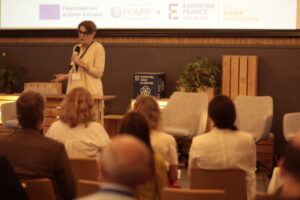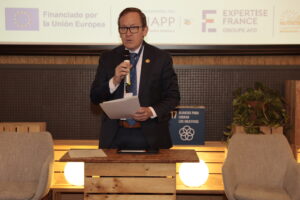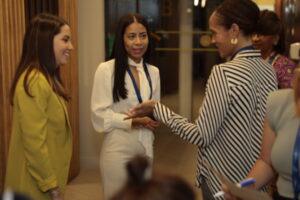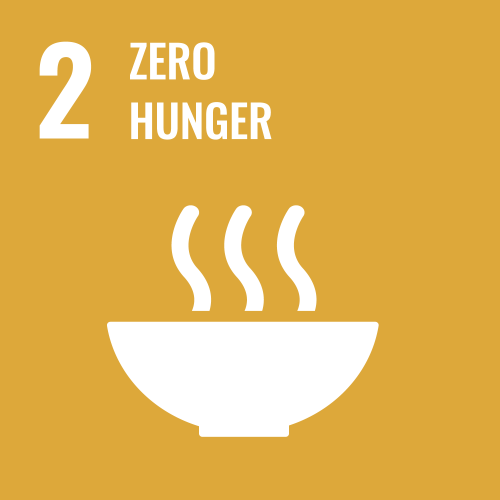
10/10/2023
The project to build public policies to end hunger and malnutrition and guarantee the human right to food begins its work
How many policies are needed to end hunger? The sum of measures from different sectors such as agriculture, health and the environment? Or a single political will that brings together the efforts of different ministries and institutions? One in each country or a single international movement? With this debate, the EU4SUN project, implemented by FIIAPP (Spanish Cooperation) and Expertise France (French Cooperation), which represents one of the main contributions of the European Union to the international SUN Movement for scaling up nutrition promoted by the United Nations since 2010, has started today in Madrid. It will be implemented in Costa Rica, Ecuador, El Salvador, Guatemala, Haiti, Honduras, Peru and Panama (in Latin America), Benin, Burkina Faso, Guinea-Bissau, Ivory Coast, Niger, Senegal and Togo (in West Africa) and Europe.
Among the participating Spanish institutions that will mobilise experts are the Spanish Agency for Food Safety and Nutrition (AESAN), the Catalan Public Health Agency and the Right to Food Observatory of the University of Seville and Enraíza Derechos.
“The challenge of ending hunger requires concerted efforts that translate into political commitments for the real implementation of policies and programmes and the mobilisation of sufficient resources to achieve a global guarantee of the human right to food. The FIIAPP enters for the first time in this global political challenge with the ambition to bring together institutions of agriculture, health, environment and equality, among others, from Latin America, West Africa and Europe to think and learn together”, said the director of the FIIAPP, Anna Terrón.

Erwin Ronquillo, technical secretary of Ecuador Grows Without Child Malnutrition, has stressed that “the challenge as a State is to ensure that the attention required by early childhood, with emphasis on the first 1000 days of life, continues to be a sustained policy with budget and staff to implement evidence-based actions. While it is true that a couple of weeks ago Ecuador showed the first encouraging results in the fight against this problem by achieving a reduction of 3.5 percentage points in Chronic Childhood Malnutrition, it is still necessary to join wills, to commit future governments and the multiplicity of actors involved to give our children a better present and a future of opportunities. The figures show that today, 20,000 children under 2 years of age are safe from this condition; however, the goal is to gradually increase the number of healthier, stronger infants with better development conditions.

Patricia Ngoran-Theckly, Advisor to the Presidency of Côte d’Ivoire and SUN Focal Point Coordinator, highlighted her country’s commitment “in pushing for the integration of policies and measures on food systems, health and social protection” while illustrating the links between nutrition and economic and social development.
Helena Guarín, representative of the European Union’s Directorate-General for International Partnerships, stressed the great relevance of this project in the current context of food crises and announced the European commitment to work for the sustainability of food systems, in a crossroads with the green agenda and for food sovereignty in order to reduce dependence on imports from the most vulnerable countries.
Sonia Ancellin-Panzani, representative of the SUN Movement Secretariat, welcomed the European Union to the SUN Movement “from which we greatly appreciate its commitment to capacity building through technical assistance and the flexibility shown by both the FIIAPP and Expertise France to do so with specific and context-specific solutions, based on listening to countries’ demand.
Until July 2026, with a total budget of 4 million euros, different institutions from the countries involved will exchange knowledge and experiences for the construction of public policies, laws, regulations and specialised institutions.

Taking advantage of the momentum of the green agenda to create more sustainable food systems that benefit small farmers, the use of schools as strategic points so that all children can have a healthy breakfast and lunch, raising awareness about healthy diets, the importance of breastfeeding, nutritional education from infancy or regulations on understandable labelling have already been some of the keys identified at the heart of the project.
The project will analyse the specific demand of each country, promote direct learning between institutions through the exchange of successful experiences and establish a roadmap to advance the realisation of the right to food and the strengthening of regional agendas.



